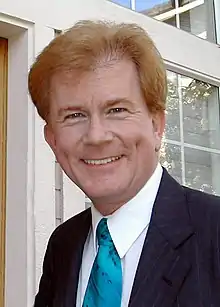John Gustafson (scientist)
John Leroy Gustafson (born January 19, 1955) is an American computer scientist and businessman, chiefly known for his work in high-performance computing (HPC) such as the invention of Gustafson's law, introducing the first commercial computer cluster, measuring with QUIPS, leading the reconstruction of the Atanasoff–Berry computer, inventing the unum number format and computation system,[1] and several awards for computer speedup. Currently he is the Chief Technology Officer at Ceranovo, Inc.[2] He was the Chief Graphics Product Architect and Senior Fellow at AMD from September 2012 until June 2013,[3][4] and he previously held the positions of Architect of Intel Labs-SC,[5] CEO of Massively Parallel Technologies, Inc.[6] and CTO at ClearSpeed Technology.[7] Gustafson holds applied mathematics degrees from the California Institute of Technology and Iowa State University.
John Leroy Gustafson | |
|---|---|
 | |
| Born | January 19, 1955 |
| Nationality | American |
| Alma mater | |
| Known for | |
| Awards |
|
| Scientific career | |
| Thesis | Asymptotic Expansions of Elliptic Integrals (1982) |
| Doctoral advisor | Bille C. Carlson |
| Website | johngustafson |
Childhood and education
Gustafson was raised in Des Moines, Iowa. After completing a degree in Applied Mathematics at California Institute of Technology in 1977 he moved to Ames, Iowa and completed his M.S. (1981) and Ph.D. (1982) at Iowa State University.
His mother was an electronics technician at Collins Radio and his father was a chemical engineer turned MD, both as a result of World War II. His parents encouraged his scientific explorations at a young age. Assembling radio transmitters, designing and executing chemistry experiments, and making holograms are some of his favorite childhood explorations.[8]
Unums
Gustafson has devised a new format for storing real numbers in computers use a variable number of bits depending on the number of digits required, called unum number format.[9] Normal formats store numbers as a fixed number of bits, for example 64 bits is usual for double-precision floating-point format numbers. This can allow them to be smaller than doubles for fast processing and also more precise or larger than the limits for double when desirable.[10]
Awards and honors
In 1988, Gustafson was the recipient of the inaugural Gordon Bell Prize. He has received other awards for his work in HPC, including the International Atanasoff Award (2006). He was awarded the IEEE Computer Society Golden Core Award in 2007.
Other awards and honors include:
- 2000 Iowa State University Inventor of the Year Award
- 1998 Distinguished Visiting Professor, New Mexico State University
- 1997 PDPTA Outstanding Achievement Award
- 1995 R&D 100 Award
- 1991 R&D 100 Award
- 1990 New Mexico Inventor of the Year Award
- 1989 R&D 100 Award
- 1977 Richter Fellowship
- 1974 Eric Temple Bell Award
- 1973 Drake Physics Prize
References
- Gustafson, John L. (2016-02-04) [2015-02-05]. The End of Error: Unum Computing. Chapman & Hall / CRC Computational Science. Vol. 24 (2nd corrected printing, 1st ed.). CRC Press. ISBN 978-1-4822-3986-7. Retrieved 2016-05-30.
- Anton, Lewey (2014-01-20). "John Gustafson Moves to Ceranovo as CTO". insideHPC. Retrieved 2015-06-27.
- "AMD Hires John Gustafson as Chief Graphics Product Architect". AMD. 2012-08-28.
- Feldman, Michael (2012-09-13). "Now at AMD John Gustafson Wants to Light a Fire Under GPU Computing". HPCwire. Archived from the original on 2016-07-11. Retrieved 2016-07-11.
- Shimpi, Anand Lal (2012-08-28). "AMD Hires Ex-Intel Labs Architect, John Gustafson, As Chief Graphics Product Architecture". AnandTech. Archived from the original on 2016-07-11. Retrieved 2016-07-11.
- Kendall, Abbie (2008-05-15). "Massively Parallel Names HPC Industry Leader John Gustafson CEO". BusinessWire. Retrieved 2016-07-11.
- Owen, Paul (2005-09-06). "Dr. John Gustafson Accepts Position with ClearSpeed Technology; HPC Industry Pioneer Joins the Company as CTO, HPC". BusinessWire. Retrieved 2016-07-11.
- Connor, Caroline (2010-10-20). "Movers and Shakers in HPC: John Gustafson". HPCwire. Archived from the original on 2012-07-22. Retrieved 2012-07-22.
- Brueckner, Rich (2015-03-02). "Slidecast: John Gustafson Explains Energy Efficient Unum Computing". The Rich Report. Inside HPC. Archived from the original on 2016-07-10. Retrieved 2016-06-10.
- "Unum Computing: An Energy Efficient and Massively Parallel Approach to Valid Numerics". March 2015. Retrieved 2016-07-11.